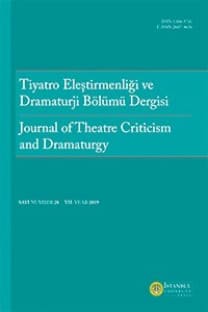Aristotelesyen Tragedya Çerçevesinde David Mamet’in “Oleanna” Oyununun İncelenmesi
David Mamet’in tartışma yaratan oyunu Oleanna, eleştirmenler tarafından, genellikle, cinsel taciz, siyaseten doğruculuk ve akademik eğitimin sorunlarını ele alan bir çerçevede değerlendirilmiştir. Mamet’in oyunları, aynı zamanda absürt tiyatro ile geleneksel realizmin bir bireşimi olarak görülmüştür. Mamet ise tüm bu yaklaşımlara karşı çıkarak Oleanna’nın, yüksek öğrenimin kurumsal zemininde, bir profesör ile öğrencisi arasındaki eşit olmayan güç ilişkisini anlatan Aristotelesyen bir tragedya olduğunu ifade etmiştir. Bu çalışmada, Mamet’in bu nitelendirmesinin izi sürülerek Oleanna, Aristotelesyen tragedyanın olay örgüsünü belirleyen unsurlar çerçevesinde değerlendirilmektedir. Bu bağlamda, Aristoteles’in tragedya tanımından hareketle, oyunun protagonisti olan profesör John ve olay örgüsü “hubris”, “hamartia”, “peripeteia”, “anagnorisis” ve “katharsis” kavramları açısından incelenerek, John’un modern trajik bir kahraman, Oleanna’nın da modern Aristotelesyen bir tragedya olduğu düşüncesi tartışılmaktadır.
Anahtar Kelimeler:
Hubris, Hamartia, Peripeteia, Anagnorisis, Katharsis
An Analysis of David Mamet's Play "Oleanna" Within the Frame of Aristotelian Tragedia
Oleanna, the controversial play by David Mamet, has generally been reviewed by the critics within the context of addressing the issues of sexual harassment, political correctness and academic education. Mamet’s plays have also been considered as a combination of absurd theatre and traditional realism. However, Mamet has dismissed all of these approaches and stated that Oleanna is an Aristotelian tragedy, depicting the unequal power relationship between a professor and his pupil against the institutional background of higher education. In this study, by pursuing this description of Mamet, Oleanna is reviewed based on the determining elements of the plot of Aristotelian tragedy. Within this context and as per Aristotle's definition of tragedy, the protagonist of the play, Professor John, and the plot are examined in terms of "hubris", "hamartia", "peripeteia", "anagnorisis" and "katharsis" concepts; arguing the notion that John is a modern tragic hero and Oleanna is a modern Aristotelian tragedy.
Keywords:
Hubris, Hamartia, Peripeteia, Anagnorisis, Katharsis,
___
- Abel, Lionel. Metatheatre A New View of Dramatic Form, New York: Hill and Wang, 1963.
- Aristoteles. Poetika, çev. İsmail Tunalı. İstanbul: Remzi Kitabevi, 1987.
- Bean, Kellie. “A Few Good Men: Collusion and Violence in Oleanna”, Gender and Genre, Essays on David Mamet. Editör Christopher C. Hudgins ve Leslie Kane, 109-123. New York: Palgrave, 2001.
- Boal, Augusto. Ezilenlerin Tiyatrosu, çev. Necdet Hasgül. İstanbul: Boğaziçi Üniversitesi Yayınevi, 2008.
- Bragg, Melvyn. “The South Bank Show”, Davet Mamet in Conversation. Editör Leslie Kane, 143-156. Ann Arbor: University of Michigan Press, 2001.
- Eksen, Kerem. “Trajik Hata ve Sessizlik”, Cogito, 54 (2010), 148-149.
- Lahr, John. “David Mamet: The Art of The Theatre XI”, Davet Mamet in Conversation. Editör Leslie Kane, 109-122. Ann Arbor: University of Michigan Press, 2001.
- Kierkegaard, Soren. Ya/Ya Da, çev. Nur Beier. İstanbul: Alfa Yayınları, 2020.Mamet, David. Oleanna, London: Methuen Drama Modern Classics, 2001.
- Murphy, Brenda. “Oleanna: language and power”, The Cambridge Companion to DavidMamet. Editör Christopher Bigsby, 124-137. Cambridge: Cambridge University Press, 2004.
- Norman, Geoffrey ve Rezek, John. “Working the Con”, Davet Mamet in Conversation. Editör Leslie Kane, 123-142. Ann Arbor: University of Michigan Press, 2001.
- Rose, Charlie. “On Theatre, Politics and Tragedy”, Davet Mamet in Conversation. Editör Leslie Kane, 163-181. Ann Arbor: University of Michigan Press, 2001.
- Said, Suzanne. “La Faute tragique”, Paris: F. Maspero, 1978.Sauer, David K. David Mamet’s Oleanna, London: Continuum Publishing, 2008.
- Schulgasser, Barbara. “Mountebanks and Misfits”, Davet Mamet in Conversation. Editör Leslie Kane, 192-210. Ann Arbor: University of Michigan Press, 2001.
- Sontag, Susan. Yoruma Karşı, çev. Osman Akınhay. İstanbul: Agora Kitaplığı, 2015.Şener, Sevda. Yaşamın Kırılma Noktasında Dram Sanatı. İstanbul: Yapı Kredi Yayınları, 1997.
- Weber, Jean Jacques. “Three models of power in David Mamet’s Oleanna”, Exploring the Language of Drama. Editör Johanathan Culpeper, Mick Short ve Peter Verdonk, 112-127. London and New York: Routledge, 2002.
- ISSN: 1303-8605
- Yayın Aralığı: Yılda 2 Sayı
- Başlangıç: 2002
- Yayıncı: İstanbul Üniversitesi
Sayıdaki Diğer Makaleler
Aristotelesyen Tragedya Çerçevesinde David Mamet’in “Oleanna” Oyununun İncelenmesi
Eugenio Barba ve Gündelik-Dışı Sahne Davranışı: Stanislavski, Meyerhold ve Grotowski Etkileri
Görünür Olma Arzumuzu Görünür Kılan Ayşe Bayramoğlu Oyunları: Hakiki Gala ve Beyaz Yalanlar
Halil Babür’ün “Kasap” Adlı Oyununun Ekofeminist Bakış Açısıyla İncelenmesi
